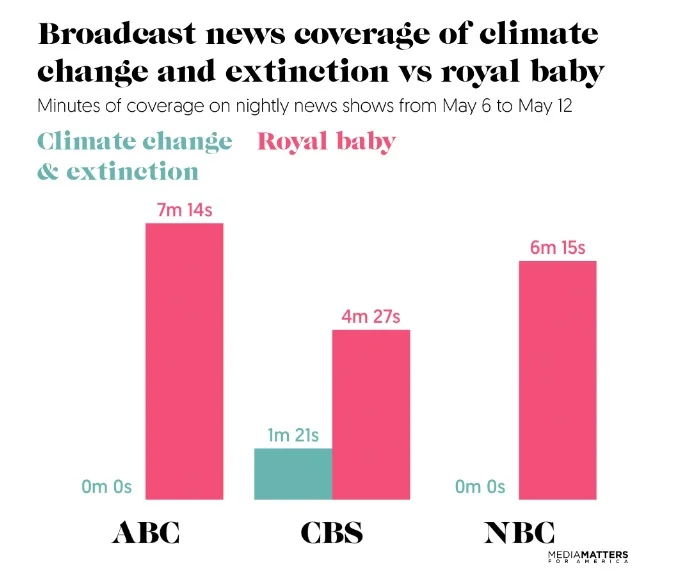The paradox of guilty pleasures
Photo by niklas_hamann on Unsplash
Let’s get this out of the way right now: It’s natural, and even necessary, to like things that have no intrinsic value. There’s nothing wrong with mindless entertainment in and of itself: sappy songs, cat videos, whatever. We don’t need to swim exclusively in the deep waters of capital-H Hard news, where it’s all environmental warnings and political dumpster fires. My browser history has plenty of low-calorie goodness. Yours should too.
But is it time to acknowledge that when it comes to how and where we give our attention, we, as a culture, have lost our sense of proportion? Have our guilty pleasures taken over?
Take this story from Media Matters, which highlights the discrepancy in TV news coverage between a bombshell U.N. report on the expected climate-related extinction of more than one million species (and the trouble that spells for our own species), and the birth of Archie Harrison Mountbatten-Windsor, newborn son to the Duke and Duchess of Sussex.
Baby Archie and the U.N. Report (new band name?) arrived the same day, May 6. Over the course of the following week, the three major American TV networks — which, even in the digital age, still reach 25 million people per day — devoted 13 times more coverage to the royal baby than the biodiversity report.
In fact, the latter received fewer than two minutes of total airtime across CBS and NBC. The news division at ABC didn’t report on it at all that week, and gave the entire topic of climate change a paltry six minutes of coverage during the entirety of 2018. Archie got more than that during the first week of his life.
And while TV news has gone the way of Dave Skylark, it’s not just television. According to Google Trends, on May 6 the royal baby represented three of the top eight Google searches. The Met Gala was number one. A new Starbucks cup was fourth.
In 2018, the Mega Millions lottery was Google’s third trendiest story — ahead of election results, the government shutdown, and Brett Kavanaugh’s confirmation hearing.
Look, this isn’t about forsaking guilty pleasures. Life is a daily challenge, and we need valves to release steam.
But we’ve gotten far away from the original concept, which is that some things, while enjoyable, are bad for us or those around us, so we do them sparingly. When we disregard consequences altogether, these are no longer guilty pleasures. They’re just bad habits.
It’s fair to direct blame at a media landscape that spoon-feeds us so much fluff. But where we get our news matters. Which shows and stories we do (or don’t) engage with tells these outlets exactly what to give us next. If you’re click-crazy on Meghan Markle, guess what? You’re going to get a lot of her, and of every conceivable related topic, and so will the rest of us.
The more real estate these stories occupy on our screens and minds, the less we see of things that have tangible effects on our actual lives.
By the same token, if you’re prone to skipping over the heavier grown-up items, they’ll continue to dry up. And yes, fine, many of them are significant bummers.
But part of being an American citizen is exercising the power we hold — theoretically, anyway — over our own politicians and media. When we stop paying even the faintest attention to serious issues, we forfeit that power.
For now, we mostly avoid the big scary stuff. Earlier this month we instead paid attention to a newborn that’s seventh in line to the throne of an obsolete monarchy with whom we once fought a war so we wouldn’t have to recognize the authority of… their monarchy.
But enough about that. What’s the deal with this new Starbucks cup?
Need a palette cleanser? Watch Dave Skylark make a passionate case for upholding the first rule of journalism.

